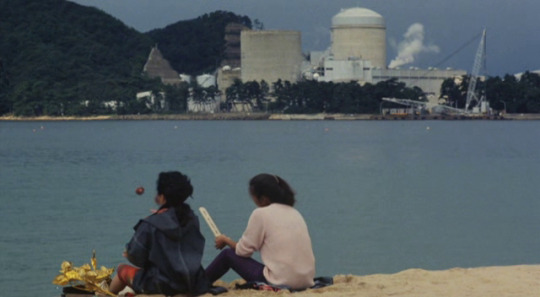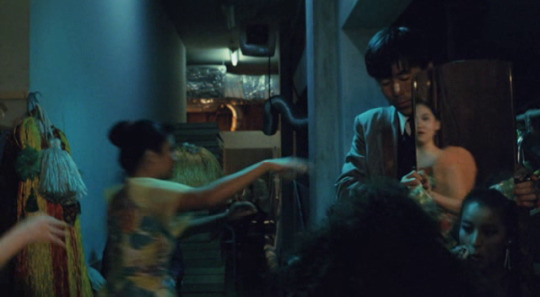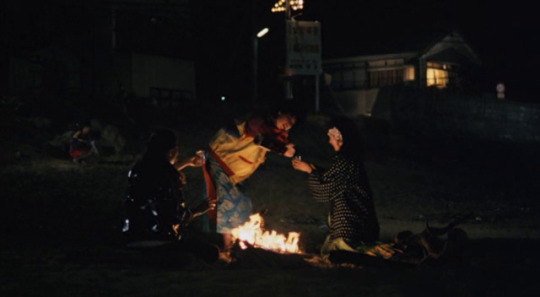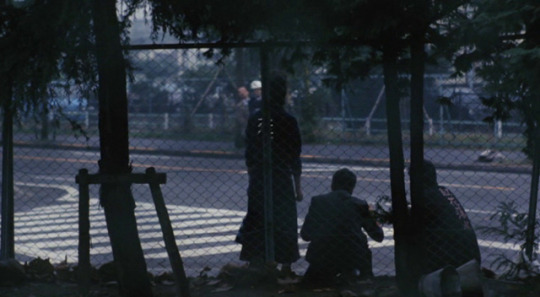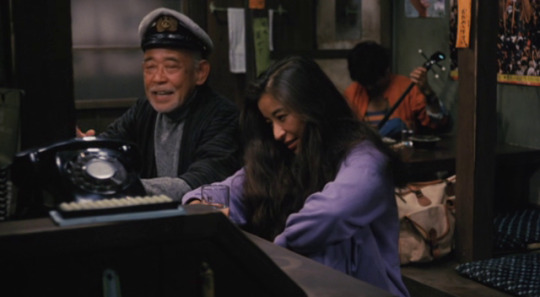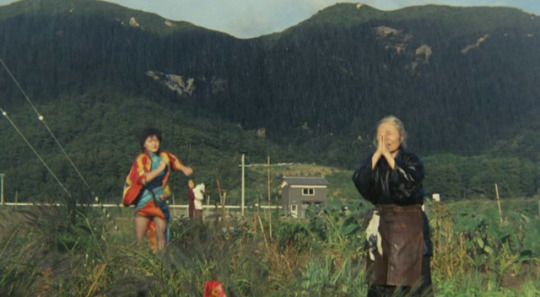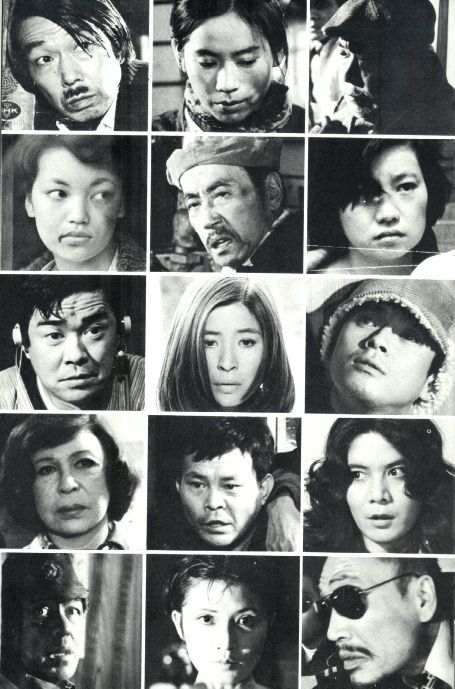#azuma morisaki
Photo
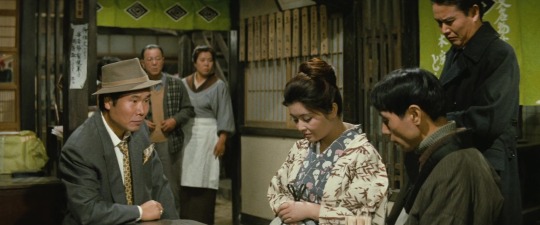
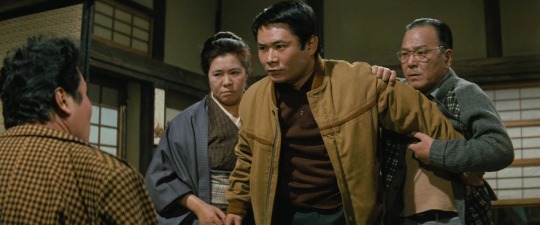


Tora-san, His Tender Love
(Azuma Morisaki, 1970)
#film#jfilm#Tora-san His Tender Love#TorasanHisTenderLove#Tora-san#Torasan#Azuma Morisaki#AzumaMorisaki#Morisaki Azuma#MorisakiAzuma#Kiyoshi Atsumi#KiyoshiAtsumi#Atsumi Kiyoshi#AtsumiKiyoshi#japan#japanese film#japanese cinema
1 note
·
View note
Text
Time and Tide (1983)

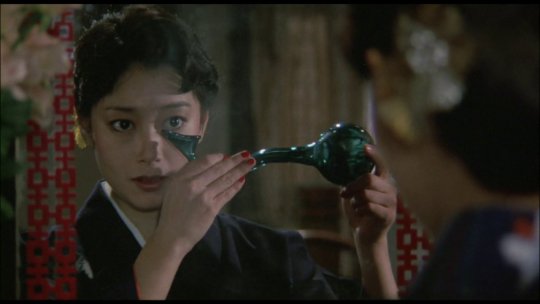


時代屋の女房 Time and Tide (1983)
directed by Azuma Morisaki
2 notes
·
View notes
Text
Nuclear Gypsies (生きてるうちが花なのよ死んだらそれまでよ党宣言), 1985 dir. Azuma Morisaki
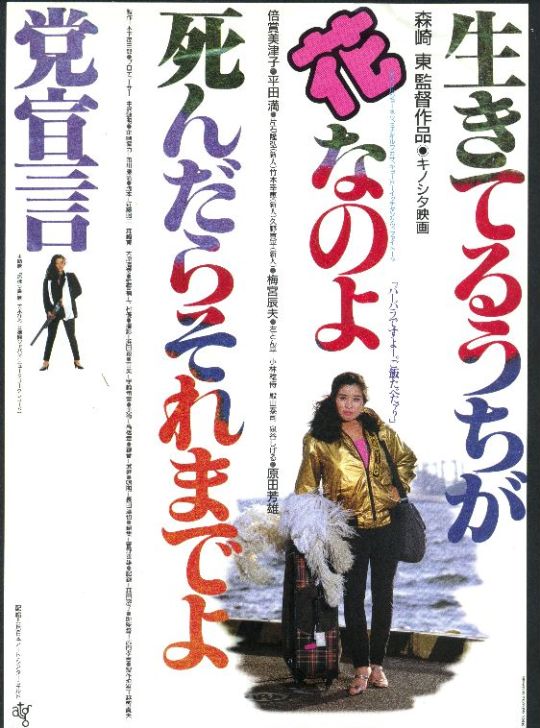
status: completed
download here
translation notes (includes spoilers):
・The film’s english title is “Nuclear Gypsies” after the central subject matter, but the Japanese title is, as you may have noticed, much longer. The Romaji reading of the absurdly long title is “Ikiteru uchi ga hana na no yo shindara soko made yo to sengen”, which roughly translates to, “Declaration by the Being Alive is the Best - If You Die, That’s It Party” - “party” meaning a political party or faction. Going even deeper, the way “being alive is the best” is phrased alludes to the Japanese way of saying “silence is golden”, “言わぬが花” (iwanu ga hana), which in itself directly translates to “not saying is a flower”. Saying something is a “flower” in this way means that it’s “the best”, so in another way the first part of the title could be directly translated to “being alive is a flower”.
It is never made explicit why this is the film’s title.
・Rafute is a signature Okinawan dish, usually consisting of cubed pork stewed in awamori (very strong Okinawan alcoholic spirit), soy sauce, dashi and sugar. Nearly all the body parts of a pig are more or less commonly eaten throughout Okinawa, which explains Barbara’s quip about the pig ears.
https://en.wikipedia.org/wiki/Rafute
・The Okinawan song first sung by Shimabukuro (the character almost only seen on screen playing a sanshin and singing) and then referenced several times throughout the movie is “Juku no Haru” 十九の春 (”Spring of My 19th Year”). Commonly misthought of as a traditional Okinawan folk song (perhaps because it was “adapted” from a much older village song whose composer is unknown), the first recording of the song was released in 1972 and has since been one of the most widely known folk songs representative of Okinawa.
Though the lyrics tell a story from multiple perspectives, which make it a bit hard to comprehend, the song is about an older married man who plans to leave his wife for a younger woman from a brothel. The first 3 verses are sung from the perspective of the wife of the older man, and then the 4th and 5th verses are thought to be from the perspective of the man’s younger lover. The film only references the 1st verse and the 4th.
・There are a few things to note when the Captain says “This is the best place in all of Japan. The Peoples’ Republic of Okinawa, settled on the waves”. The first is that he may be referring to the Ryukyu (former name of Okinawa) independence movement, which has been present since the US occupation after WWII; the second is that “settled on the waves” is a play on words from the name of the eatery that Barbara’s family (?) runs, “Nami no Ue” 波の上、or “on the waves”.
・The Eisa festival is one of Okinawa’s biggest annual traditional festivals, held in late summer. https://www.visitokinawa.jp/information/eisa
・”Tokoyo-no-shima” is a mythological place from ancient Japanese folklore which conjures images of a “distant, otherworldly land”, and has the same connotation as “Heaven”, or at times, “Hades”. I believe the name comes from the story of Tokoyo, who sails to far off islands to search for her banished father. “Tokoyo-no-shima” is likely closely related to “Tokoyo-no-kuni”, which is the land beyond the living (like the afterlife, but not really sinister).
・Miyazato making a joke about wrapping things up in old newspaper and exchanging them for tissues refers to an old system in Japan where people could exchange things for tissue/toilet paper.
・Tadashi, an aspiring yakuza underling, refers to Miyazato as “aniki” 兄貴 which is a common way to politely address someone older or above you in rank (sometimes also of the same rank) within yakuza gangs. It translates literally to “(older) brother”, but I have avoided directly translating it to complicate the character relationships.
・A goza mat is a cheap mat made of rush, common in old Japanese houses.
・Kokusai Street (Kokusai-dori) is one of the main streets in downtown Naha, Okinawa.
・Many references are made to a “hanba” 飯場 which can mean a construction camp, bunkhouse or living quarters for workers depending on the context. In Nuclear Gypsies, they refer to the poorly kept living quarters that plant workers live out of, so translations of the term stem from “plant workers’ living quarters”, shortened when necessary.
・Aiko tells the story of how she was named by referring to words used when playing Japanese rock-paper-scissors, “Jan-ken-pon”じゃんけんぽん. I won’t go into the details of the language used in Jan-ken-pon, but the phrase “aiko deshou!”アイコでしょう!is what you say when the first round yields no winners, and so another round is required (usually in quick succession). The phrase “aiko deshou” literally means “it’ll be a tie, won’t it!”, which ties in to Aiko’s story about her name.
・There is a section in the film where Aiko reminisces about all the people she’s met, beginning with the people at the living quarters she was at. The rhythm of her pattern of speech gradually starts to follow a simple possessive grammar that is easy to say in Japanese but difficult to capture in English - for example, “tsume-kami no Takeuchi sensei” 爪噛みの竹内さん puts together the verb/noun - “nail-biting” - with the name of someone - “Mr. Takeuchi”, more or less indicating that the thing that represents that person the most is said verb/noun; an easier example is “Sawa from Shinonome” - “Shinonome no Sawa san”. These get very complicated and Japanese-centric as Aiko goes on, and while I have tried to capture the bizarre nature of her monologue, there is not enough subtitle space to fully translate the multitude of strange expressions she uses to describe all these people, all of them unique. Moreover, her dialogue begins to multiply around 2-3 times and overlap over one another, making it near impossible to transcribe all the things that are being said. Where possible I have included 2 simultaneous dialogue lines in the subtitles, but otherwise I have chosen to only transcribe and translate the lines that can be heard more or less prominently.
・“Distribution of mementos” refers to “katami-wake” 形見分け, a Japanese custom of giving away the belongings of someone that has recently passed away to family members or others close to the deceased.
・A fox’s wedding is a Japanese expression used to describe a sun shower. Where the term “kitsune no yomeiri” 狐の嫁入り is used, I have chosen to leave it in its literal translation rather than translate it as “sun shower”, as later in a pivotal scene where a sun shower happens, the characters refer to it using a different expression.
・At Aiko’s wedding, the “exchanging of nuptial cups” refers to “san-san kudo” 三々九度, a Shinto marriage ritual of exchanging sake cups between a newly wedded couple.
・When Ginko talks to Barbara about Maria’s future, she actually says something along the lines of her “living like a dog who’s being kept alive beyond its useful life”. This somewhat disheartening expression is “kaigoroshi” 飼い殺し in Japanese, whose kanji literally means “killing by owning”. The expression has come to mean someone who is being kept on a payroll despite not being utilized for their skills. I have tried to reflect this in the subtitles.
・When Miyazato mentions “hateful uranium”, the Japanese being spoken is “uraminyumu” 恨みニューム, which is a portmanteau of “urami” 恨み or “grudge, resentment, malice”, and the Japanese pronunciation of uranium. I couldn’t think of any appropriate ways of reflecting this play on words in English, so I have translated it normally.
・I could not find any reference to the Okinawan expression about hands and elbows mentioned by Tamae’s mother at the end of the film, so I’m unsure as to whether it’s real or not. Similarly, I could not locate any references to Shimabukuro’s ominous response “Higan-jirai jishiki, ichigan-jira ishiki”, so I am unable to translate it. It sounds vaguely Buddhist, or it may be some uncommon idiomatic expression - I have no idea, unfortunately. If anyone knows, feel free to get in contact and fill me in - I would love to know!
2 notes
·
View notes
Photo

My Favorite Character Bingo
Part 1
Black ☆ Rock Shooter : BRS
Captain Tsubasa : Tsubasa Ozora , Taro Misaki , Kojiro Hyuga , Genzo Wakabayashi and Yuzo Morisaki
Casshern ( Neo Human Casshern ) : Testuya Azuma , Casshern , Luna Kozuki
Casshern ( Casshan : Robot Hunter ( OVA ) : Testuya Azuma , Casshern , Luna Kozuki ( All remake )
Hataraku Saibou : White Blood Cel ( U-1146)
Mahha Gogogo ( 1967 ) : Go Mifune
Mahha Gogogo ( 1997 ) : Go Hibiki
Mikagura School Suite : Eruna Ichinomiya and Himi Yasaka
Mezzo DSA : Mikura Suzuki
Mozaik Role : Megumi Nakashiro
Rurouni Kenshin : Kenshin Himura , Kaoru Kamiya , Sanosuke Sagara
TAWUR : Budi and Starki Karinda
#black rock shooter#captain tsubasa#casshern#casshan robot hunter#mach gogogo#speed racer#mikagura school suite#mezzo#mozaik role#hataraku saibou#rurouni kenshin#tawur#favorite character bingo
14 notes
·
View notes
Text
The Love and Adventures of Kuroki Taro (1977)

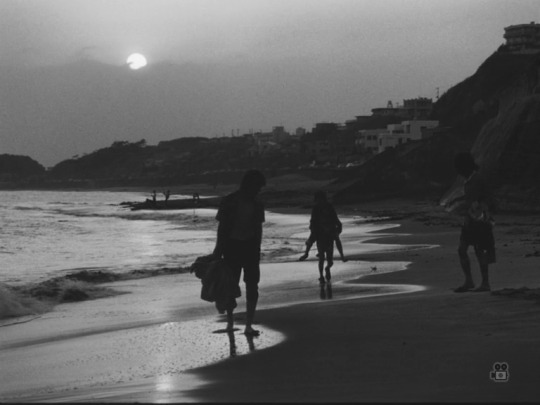

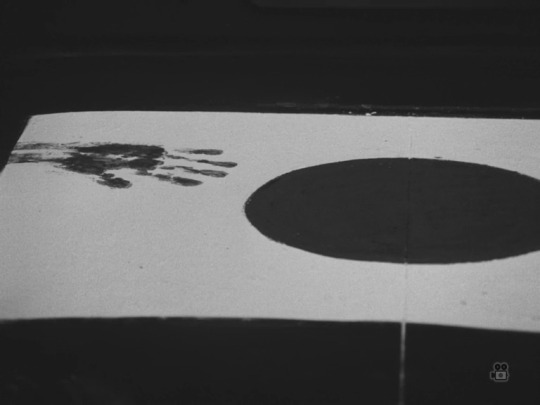
黒木太郎の愛と冒険 The Love and Adventures of Kuroki Taro (1977)
directed by Azuma Morisaki
#黒木太郎の愛と冒険#the love and adventures of kuroki taro#azuma morisaki#japanese film#japanese cinema#1970s#stills
2 notes
·
View notes
Text
A special update from OHAKOSUBS
Hi folks,
It’s been a while since there has been any major updates from OHAKOSUBS - my apologies. Due to various life priorities it has been a bit difficult for me to find time to do subtitle work over the last 2 years or so, unfortunately, so I was forced to take an unexpected hiatus.
With the recent situation surrounding COVID-19 however, as I’m sure is the case with a lot of things around the world, I have been able to make time to resume subtitling. As such, this week I have managed to complete 2 of the subtitling projects I had been working on - Azuma Morisaki’s “Nuclear Gypsies”, and a rare Seicho Matsumoto film adaptation called “Bonds of Love”.
These subs and their translation notes will be added to this tumblr shortly.
Thank you as always for your support and positive feedback, it has been a joy to be part of the Japanese cinema-loving community and I hope to continue contributing to it.
1 note
·
View note
